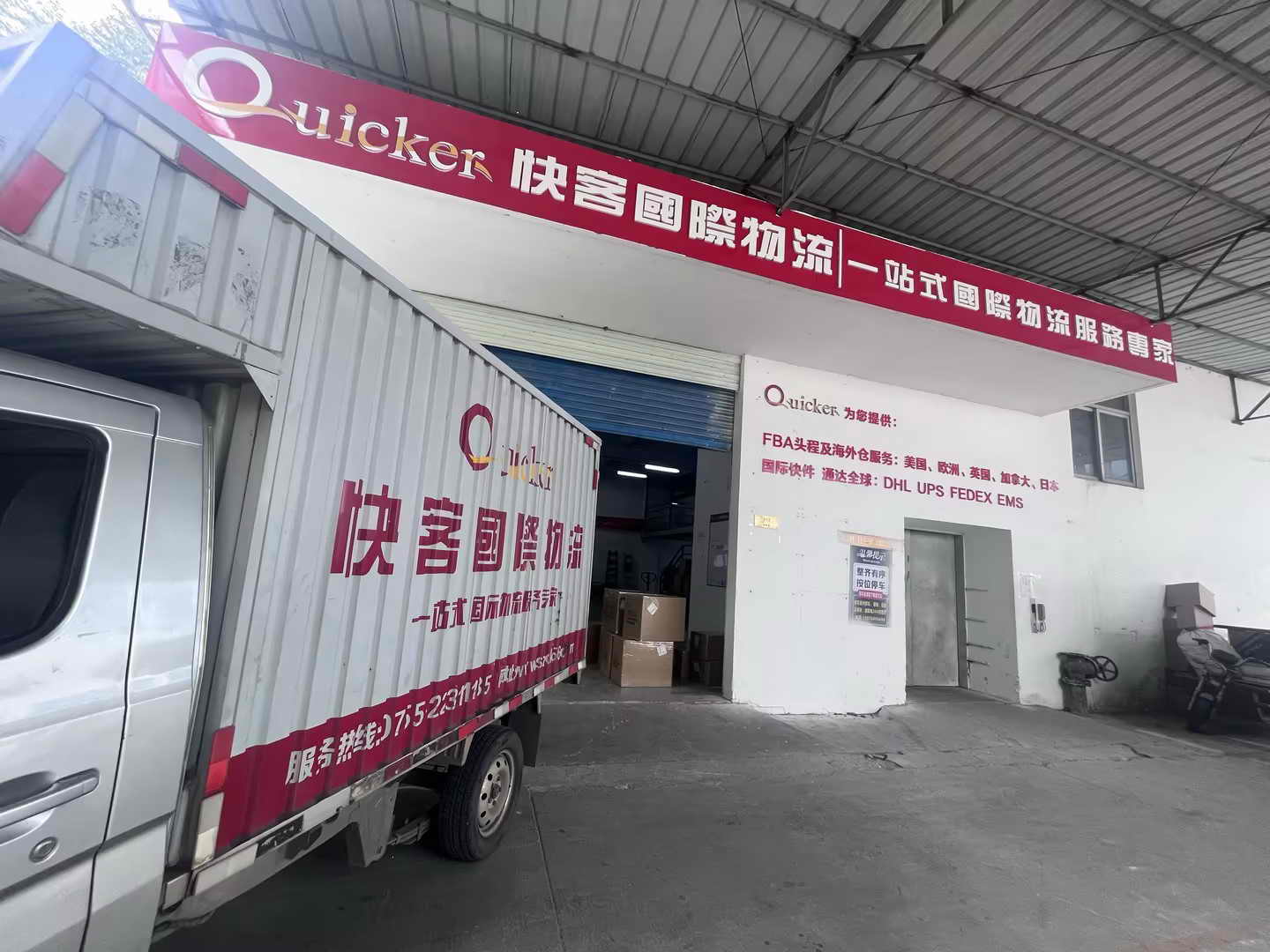더 빠른 해상 화물 포워딩 서비스 선택
크리스마스 매장 진열대를 위한 상품 도착에 부담이 되시나요?
Free Consult us ocean freight forwarding RIGHT NOW to ease your delivery pressure
Quicker Ocean Freight Forwarding Service 스탠다드 및 프리미엄
전 세계 인증 및 전문 네트워크 연결. 중국 내 모든 항구, 모든 도시 픽업. 모든 도시 육상 운송

해상 배송 프로세스
예약 공간 배송 확인 릴리스 SO IAL 및 빈 용기 픽업 빈 컨테이너 로드 전체 컨테이너 반환 중국 세관 신고 출발 대기 중 출발 확인 교통편 보험 선하증권 만들기 목적지 세관 통관 필요한 경우 육상 운송
표준 서비스 및 프리미엄 서비스
공급망 주문 이행과 함께
Quicker has 18 years of experience in ocean freight forwarding service from China. Annually, we handle more than 10,000 TEUs of containers, shipped from major ports in China to all over the world. We provide customized logistics solutions to global importers.
프리미엄 서비스
중국 전역의 도시에서 상품 픽업
라벨링 및 팔레타이징과 같은 3PL 서비스
POL 및 POD의 창고 보관 서비스
목재 포장 또는 상품 훈증 소독
수출입 통관
방문 배송
Major Sea Ports in China
Sea ports are located on coastlines or river estuaries. They are used for maritime trade and transportation. China has an extensive network of sea ports. Major and minor types. The major sea ports in China are huge enough to be key hubs in global trade. They can handle large volumes of cargo. Naturally, they are equipped with most advanced infrastructure. From north to south, the major ports in mainland China contains Dalian, Tianjin, Qingdao, Shanghai, Ningbo, Xiamen, Guangzhou, Shenzhen and Hong Kong.
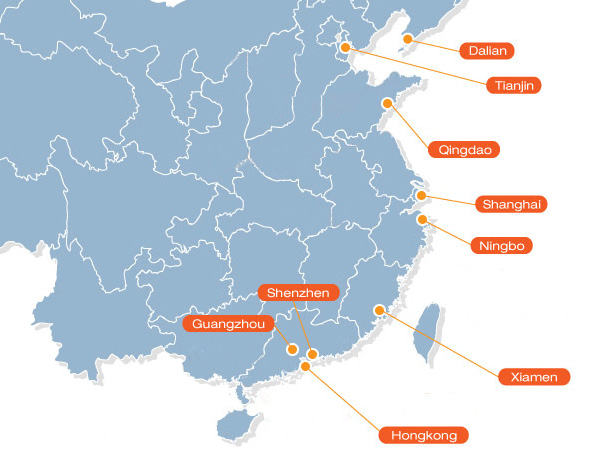
| Port code | Port name in English | Port name in Chinese | Country |
|---|---|---|---|
| CNNSA | GUANGZHOU,NANSHA | 广州-南沙 | 중국 |
| CNANQ | ANQING | 安庆 | 중국 |
| CNAOJ | AOJIANG | 鳌江 | 중국 |
| CNAQG | ANCHING | 安庆 | 중국 |
| CNBAO | BAOSHANMATOU | 宝山码头 | 중국 |
| CNBAS | BASUO | 八所 | 중국 |
| CNBHI | BEIHAI | 北海 | 중국 |
| CNBJN | BEIJIN | 北津 | 중국 |
| CNBLG | BEILUNGANG | 北仑港 | 중국 |
| CNBOH | BOHE | 博贺 | 중국 |
| CNCGS | CHANGSHA | 长沙 | 중국 |
| CNCGZ | CHANGZHOU | 常州 | 중국 |
| CNCHQ | CHONGQING | 重庆 | 중국 |
| CNCJG | CHENJIAGANG | 陈家港 | 중국 |
| CNCSM | CHENSHANMATOU | 陈山码头 | 중국 |
| CNDAL | DALIAN | 大连 | 중국 |
| CNDCW | SHENZHEN,DACHANWAN | 深圳-大铲湾 | 중국 |
| CNDDG | DANDONG | 丹东 | 중국 |
| CNDIN | DINGHAI | 定海 | 중국 |
| CNDKZ | DIAOKOUZHEN | 刁口镇 | 중국 |
| CNDQH | DAQINGHE | 大清河 | 중국 |
| CNDSN | DONGSHAN | 东山 | 중국 |
| CNDXG | DALIANXINGANG | 大连新港 | 중국 |
| CNFAN | FANGCHENG | 防城 | 중국 |
| CNFOS | FOSHAN | 佛山 | 중국 |
| CNFUZ | FUZHOU | 福州 | 중국 |
| CNGUA | GUANGZHOU | 广州 | 중국 |
| CNHAI | HAIAN | 海安 | 중국 |
| CNHDO | HUANGDAO | 黄岛 | 중국 |
| CNHFI | HEFEI | 合肥 | 중국 |
| CNHKO | HAIKOU | 海口 | 중국 |
| CNHM | HUMEN | 虎门 | 중국 |
| CNHME | HAIMEN | 海门 | 중국 |
| CNHPU | GUANGZHOU,HUANGPU | 广州-黄埔 | 중국 |
| CNJGY | JIANGYIN | 江阴 | 중국 |
| CNJIN | JINZHOU | 锦州 | 중국 |
| CNJMN | JIANGMEN | 江门 | 중국 |
| CNJUJ | JIUJIANG | 九江 | 중국 |
| CNJZU | JINGTANG | 京唐港 | 중국 |
| CNLAI | LAIZHOU | 莱州港 | 중국 |
| CNLHS | LUHUASHAN | 绿华山 | 중국 |
| CNLKU | LONGKOU | 龙口 | 중국 |
| CNLON | LONGYAN | 龙眼港 | 중국 |
| CNLSN | LANSHAN | 岚山 | 중국 |
| CNLUO | LUOJING | 罗泾 | 중국 |
| CNLUS | LUSHUN | 旅顺 | 중국 |
| CNLYG | LIANYUNGANG | 连云港 | 중국 |
| CNMAG | SHENZHEN,MAGANG | 深圳-妈湾 | 중국 |
| CNMAS | MAANSHAN | 马鞍山 | 중국 |
| CNNBA | NANBAO | 南堡 | 중국 |
| CNNBO | NINGBO | 宁波 | 중국 |
| CNNCH | NANCHANG | 南昌 | 중국 |
| CNNJG | NANJING | 南京 | 중국 |
| CNNMG | NANMENGANG | 南门港 | 중국 |
| CNNTG | NANTONG | 南通 | 중국 |
| CNPHU | PENGHU | 澎湖 | 중국 |
| CNPIN | PINGTAN | 平潭 | 중국 |
| CNPLI | PENGLAI | 蓬菜 | 중국 |
| CNPSI | PANSHI | 盘石 | 중국 |
| CNPUT | PUTUO | 普陀 | 중국 |
| CNQHD | QINHUANGDAO | 秦皇岛 | 중국 |
| CNQIN | QINGDAO | 青岛 | 중국 |
| CNQLN | QINGLAN | 清澜 | 중국 |
| CNQUA | QUANZHOU | 泉州 | 중국 |
| CNQZH | QINZHOU | 钦州港 | 중국 |
| CNRSK | RUSHANKOU | 乳山口 | 중국 |
| CNRUI | RUIAN | 瑞安 | 중국 |
| CNRZH | RIZHAO | 日照港 | 중국 |
| CNSDG | SHUIDONG | 水东 | 중국 |
| CNSDU | SANDU | 三都 | 중국 |
| CNSHA | SHANGHAI | 上海 | 중국 |
| CNSHD | SHIDAO | 石岛 | 중국 |
| CNSHE | SHENZHEN,SHEKOU | 深圳-蛇口 | 중국 |
| CNSHG | SHANHAIGUNA | 山海关 | 중국 |
| CNSJM | SHENJIANMEN | 沈家门 | 중국 |
| CNSPU | SHIPU | 石浦 | 중국 |
| CNSQI | SAIQI | 赛岐 | 중국 |
| CNSSI | SHENGSI | 嵊泗 | 중국 |
| CNSTO | SHANTOU | 汕头 | 중국 |
| CNSUD | SHUNDE | 顺德 | 중국 |
| CNSWE | SHANWEI | 汕尾 | 중국 |
| CNSYA | SANYA | 三亚 | 중국 |
| CNSYG | SHEYANG | 射阳 | 중국 |
| CNSZN | SHENZHEN | 深圳 | 중국 |
| CNTAZ | TAIZHOU,CN | 泰州 | 중국 |
| CNTCG | TAICANG | 太仓 | 중국 |
| CNTGU | TANGGU | 塘沽 | 중국 |
| CNTJN | TIANJIN | 天津 | 중국 |
| CNTOL | TONGLING | 铜陵 | 중국 |
| CNTXG | TIANJINXINGANG | 天津新港 | 중국 |
| CNWAN | WANGTAN | 王滩 | 중국 |
| CNWEI | WEIHAI | 威海 | 중국 |
| CNWEN | WENZHOU | 温州 | 중국 |
| CNWHA | WUHAN | 武汉 | 중국 |
| cnwuh | WUHU | 芜湖 | 중국 |
| CNWXI | WUXI | 无锡 | 중국 |
| CNXIA | XIAMEN | 厦门 | 중국 |
| CNXYG | XIUYUGANG | 秀屿港 | 중국 |
| CNYAN | YANTAI | 烟台 | 중국 |
| CNYGZ | YANGZHOU | 扬州 | 중국 |
| CNYIN | YINGKOU | 营口 | 중국 |
| CNYPG | YANGPUGANG | 洋浦港 | 중국 |
| CNYTN | SHENZHEN,YANTIAN | 深圳-盐田 | 중국 |
| CNYWG | YANWEIGANG | 燕尾港 | 중국 |
| CNYXG | YINGKOUXINGANG | 营口新港 | 중국 |
| CNZGG | ZHANGGANG | 漳港 | 중국 |
| CNZHA | ZHANJIANG | 湛江 | 중국 |
| CNZHE | ZHENJIANG | 镇江 | 중국 |
| CNZHH | ZHUHAI | 珠海 | 중국 |
| CNZHI | ZHENHAI | 镇海 | 중국 |
| CNZHU | ZHUANGHE | 庄河 | 중국 |
| CNZJB | ZHANGJIABU | 张家埠 | 중국 |
| CNZJG | ZHANGJIAGANG | 张家港 | 중국 |
| CNZOS | ZHOUSHAN | 舟山 | 중국 |
| CNZPU | ZHAPU | 乍浦 | 중국 |
| CNZSN | ZHONGSHAN | 中山 | 중국 |
| CNZWN | ZHANGWAN | 章湾 | 중국 |
| CNZZU | ZHANGZHOU | 漳州港 | 중국 |
South China Major Port: Hong Kong Port
Hong Kong Port stands as one of the world’s premier logistics centers, renowned for its strategic location and unparalleled connectivity. Nestled at the crossroads of major shipping routes, the port serves as a vital gateway between Asia and the rest of the globe. With its deep-water harbor, Hong Kong Port can accommodate some of the largest container vessels, making it a preferred choice for international shipping lines. The port’s advanced infrastructure, including state-of-the-art container terminals and efficient customs operations, facilitates swift cargo handling and transit, significantly enhancing supply chain efficiency.
In addition to its impressive cargo capabilities, Hong Kong Port is supported by a well-developed logistics ecosystem that includes extensive warehousing, distribution centers, and transportation networks. The port’s proximity to the bustling financial district and its seamless integration with air and land transport further bolster its status as a logistics hub. This strategic advantage attracts a diverse range of businesses, from multinational corporations to local enterprises, all seeking to leverage Hong Kong’s robust logistics framework to optimize their supply chains. As a result, Hong Kong continues to play a pivotal role in global trade, serving as a critical link in the movement of goods across Asia and beyond.
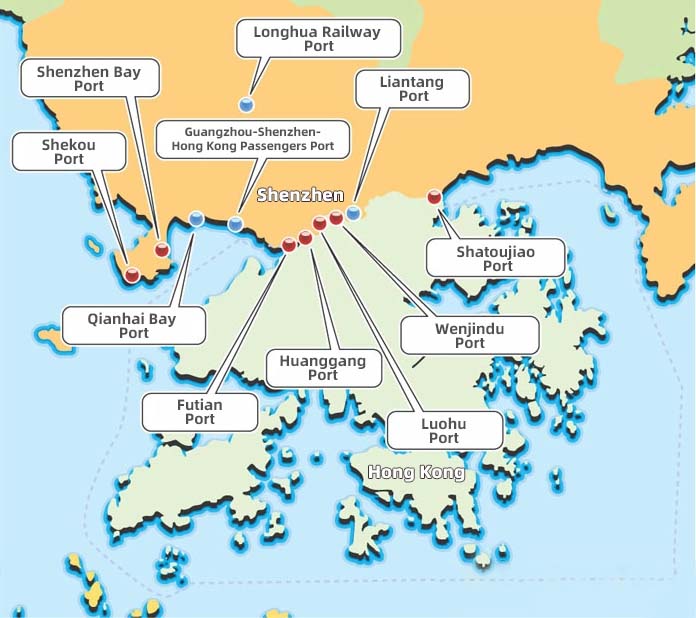
South China Major Port: Yantian Port in Shenzhen
Yantian Port is one of the key container ports in Shenzhen, China, and is recognized as one of the busiest ports in the world. Strategically located near Hong Kong, Yantian serves as a major gateway for international trade, particularly for goods destined for North America and Europe. The port features advanced container handling facilities and has a deep-water harbor that accommodates some of the largest container ships. With its efficient operations and state-of-the-art technology, Yantian Port plays a crucial role in supporting Shenzhen’s position as a global manufacturing hub, particularly for electronics and consumer goods.
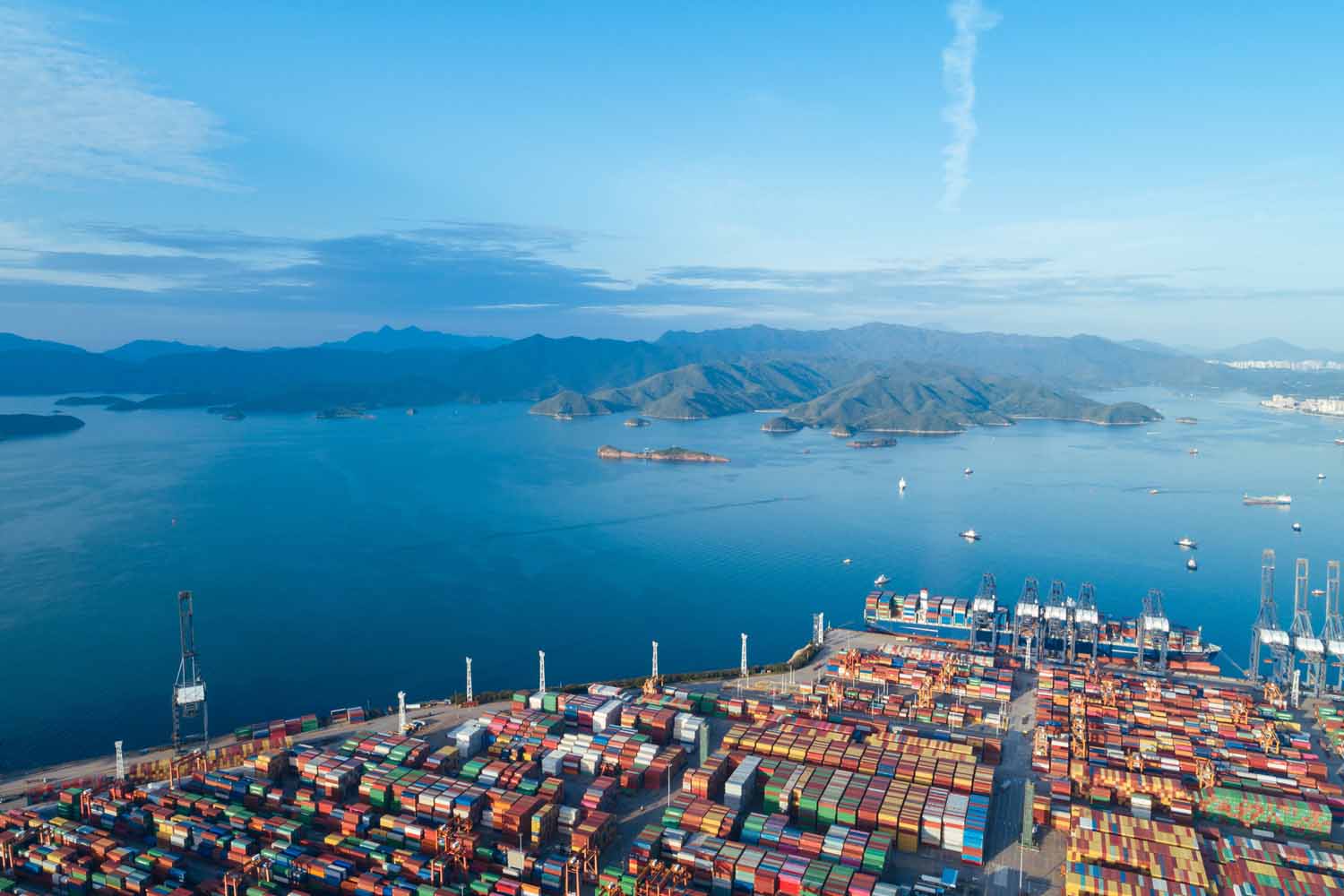
South China Major Port: Shekou Port in Shenzhen
셰커우 항구, also located in Shenzhen, is another significant maritime facility, although it primarily focuses on passenger and ferry services, as well as smaller cargo operations. Historically, Shekou has been a vital point for trade and transportation, connecting Shenzhen with Hong Kong and other coastal cities. The port has undergone significant development to enhance its infrastructure and services, catering to both domestic and international travelers. While not as large as Yantian in terms of container traffic, Shekou Port contributes to the region’s logistics network by facilitating the movement of goods and people, thereby supporting the overall economic growth of Shenzhen.
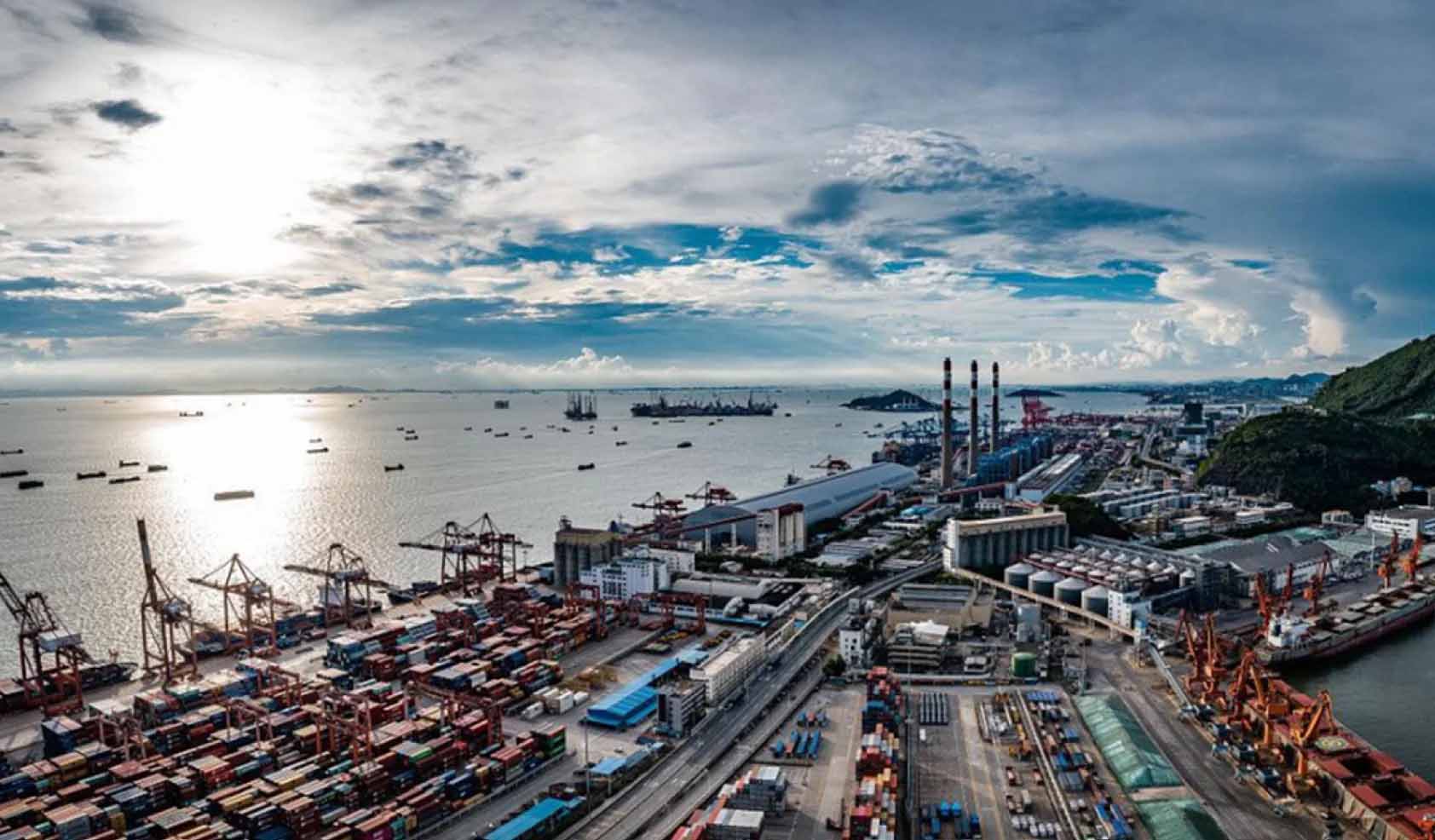
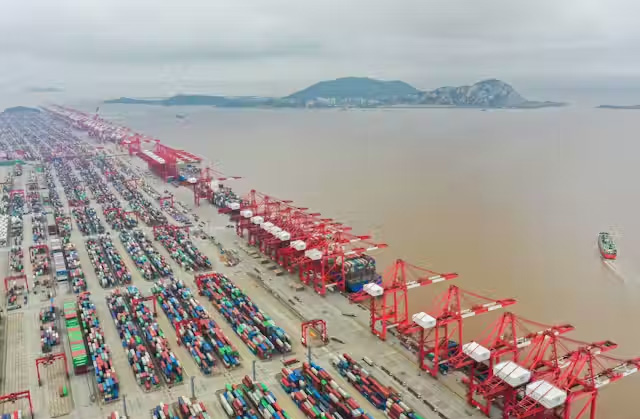
East China Major Ports: The Ports in Shanghai
Shanghai is home to several major sea ports, with the most prominent being. Shanghai’s port facilities are extensive and well-equipped, making it a central hub for maritime trade in Asia and globally.
Shanghai Port: This is the largest and busiest port in China and one of the busiest in the world. It comprises multiple terminals, including the Yangshan Deep-Water Port and the Waigaoqiao Port, which handle a significant volume of container traffic.
Yangshan Deep-Water Port: Located on an island south of the city, this port is specifically designed to accommodate large container ships due to its deep-water capabilities. It is a crucial part of Shanghai’s overall port infrastructure.
Waigaoqiao Port: This terminal focuses on container shipping and is part of the larger Shanghai Port complex. It plays a key role in handling both domestic and international cargo.
Huangpu River Ports: While not a single port, the ports along the Huangpu River, including those for bulk cargo and general cargo, are integral to Shanghai’s logistics and shipping operations.
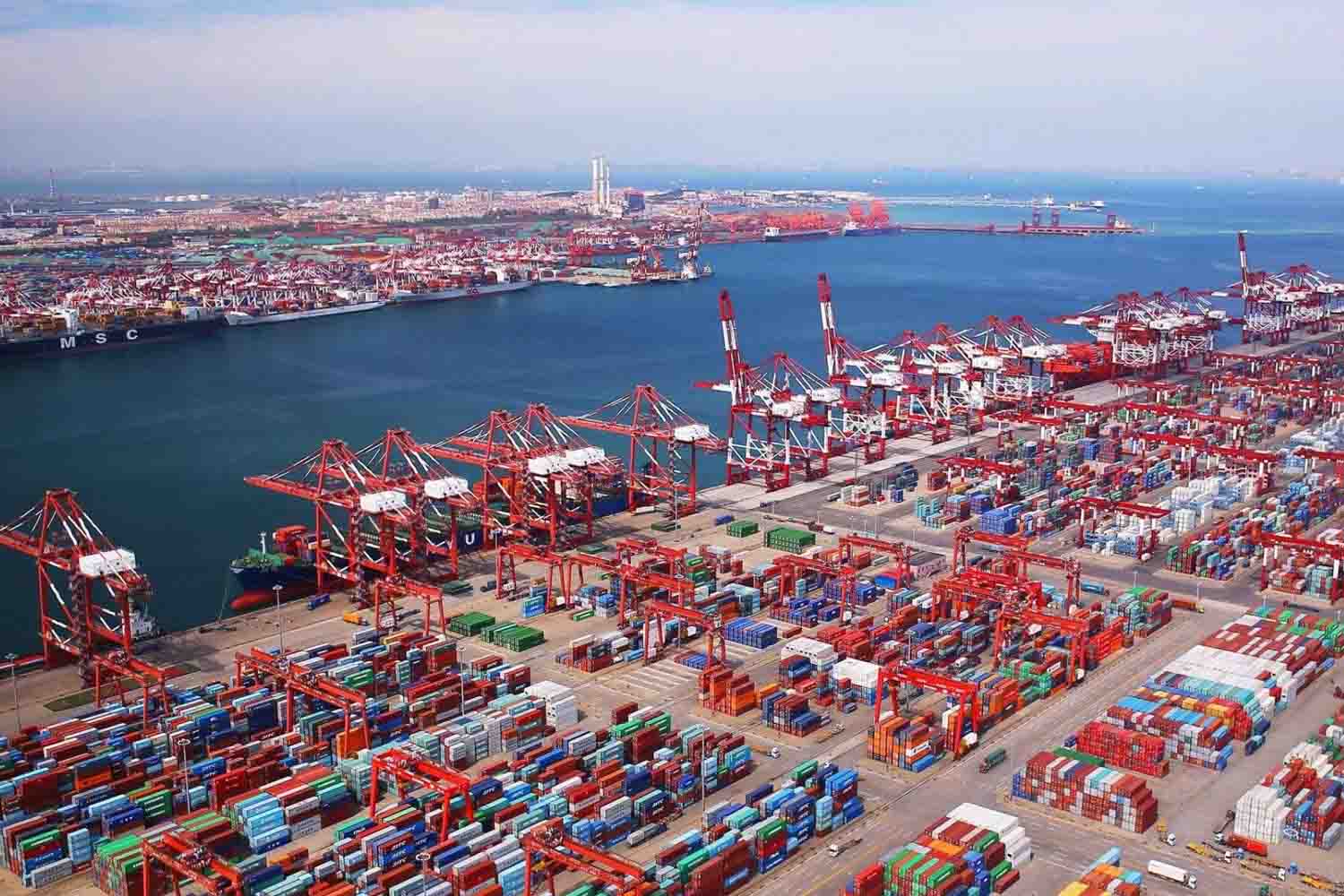
North China Major Port: The Qingdao Port
Qingdao Port, located in Shandong Province, China, is one of the country’s largest and busiest ports, renowned for its strategic location along the Yellow Sea. As a major hub for international trade, it features deep-water capabilities that allow it to accommodate large container ships and bulk carriers. The port is equipped with advanced facilities, including multiple container terminals, oil and gas terminals, and specialized handling equipment for various cargo types. Qingdao Port is particularly significant for its role in facilitating trade for industries such as electronics, machinery, and agricultural products. Its well-developed logistics network and efficient operations make it a crucial gateway for goods entering and leaving northern China, enhancing its position in the global maritime trade landscape.
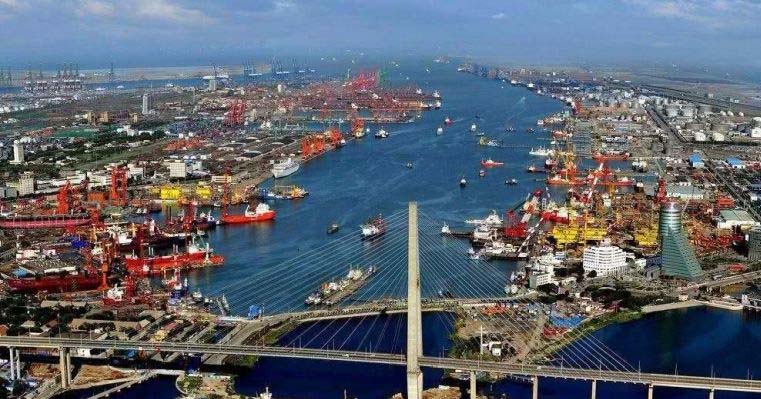
North China Major Port: The Tianjin Port
Tianjin Port, situated in Tianjin Municipality near the Bohai Sea, is one of China’s largest and most important ports, serving as a key gateway for northern China. It is renowned for its deep-water capabilities, allowing it to accommodate large container vessels and bulk carriers. The port features a comprehensive range of facilities, including multiple container terminals, bulk cargo terminals, and specialized terminals for oil and chemicals. Tianjin Port plays a vital role in supporting the region’s economy, facilitating trade for various industries such as manufacturing, electronics, and logistics. Its strategic location near Beijing and extensive transportation networks, including rail and road connections, enhance its significance as a logistics hub, making it a crucial player in both domestic and international trade. Additionally, Tianjin Port is part of the larger Bohai Rim economic zone, further solidifying its status as a key maritime trade center in China.
MAJOR SHIPPING LINES FROM CHINA
China’s shipping industry is diverse, featuring a mix of major global players and regional lines that cater to specific markets.
Major Global Shipping Lines
COSCO Shipping Lines
Maersk Line
MSC (Mediterranean Shipping Company)
Hapag-Lloyd
CMA CGM
Evergreen Marine
Yang Ming Marine Transport Corporation
ONE (Ocean Network Express)
ZIM Integrated Shipping Services
Hanjin Shipping (part of other entities)
Regional and Smaller Shipping Lines
Sinotrans Limited
Wanhai Lines
Pacific International Lines (PIL)
Yangtze River Express
Kerry Logistics
China Shipping Container Lines (CSCL)
Xiamen International Shipping
Zhonggu Logistics
Long Beach Container Terminal
Hainan Strait Shipping
A Brief Introduction To Above Shipping Lines
The major global shipping lines like COSCO, Maersk, and MSC dominate international routes, connecting China to Europe, North America, and beyond. These companies offer extensive networks, modern fleets, and advanced logistics solutions, making them essential for global trade.
In addition to these giants, regional and smaller shipping lines play a crucial role, particularly in Southeast Asia and nearby regions. Sinotrans Limited and Wanhai Lines are well-known for their services within Asia, providing competitive options for shipping goods between China and Southeast Asian countries. Pacific International Lines (PIL) also focuses on routes in this region, ensuring efficient transport of cargo.
Yangtze River Express and Kerry Logistics offer specialized services, often integrating air and sea freight, which is beneficial for time-sensitive shipments. China Shipping Container Lines (CSCL), although part of COSCO now, continues to operate under its brand for regional services.
Xiamen International Shipping and Zhonggu Logistics cater to niche markets, providing tailored solutions for specific cargo types or trade routes. Long Beach Container Terminal and Hainan Strait Shipping focus on specific coastal routes, enhancing connectivity for regional trade.
Together, these shipping lines facilitate the flow of goods not only between China and major global markets but also within the dynamic Southeast Asian region, supporting the growth of trade and commerce in this vibrant area. As trade patterns evolve, these companies continue to innovate, focusing on sustainability and efficiency to meet the demands of their customers. Learn ocean freight forwarding service of Quicker International Logistics, an one-stop international logistics forwarder with 18 years operating experience.
Shipping Time From China To Other Regions
| Region | How Long? |
|---|---|
| USA & Canada (West) | 20 days |
| USA & Canada (East) | 30 days |
| Western Europe | 25 days |
| Northern Europe | 30 days |
| Southern Europe | 27 days |
| 호주 | 15 days |
| 인도 | 15 days |
| 동남아시아 | 9 days |
| Eastern Africa | 30 days |
| Western Africa | 40 days |
| 일본 | 3일 |
| South Korea | 4 days |
| South America (East) | 30 days |
| South America (West) | 45 days |
FCL or LCL shipping?
FCL Shipping

FCL shipping is when a single shipment takes up the entire space of the shipping container. For example, a 20′ General Purpose shipping container can hold up to 32m3 of products inside. So if the total size or weight of the products takes up the majority of the shipping container, FCL shipping will be used. So the shipper will pack all of their products into the shipping container and the International seafreight will be charged as a full shipping container.
LCL Shipping

LCL shipping is utilized when the shipper’s goods are relatively small, such as just a few pallets. In this scenario, multiple shippers send their cargo to a warehouse, where the various shipments are consolidated into a shared shipping container. Instead of charging for the entire container, freight costs are calculated based on the individual shipper’s cargo, either by its total volume (cubic meters) or weight (metric tonnes), depending on which is greater.
Local Customs Clearance & Land Transportation
In today’s global trade environment, many overseas clients require supply chain ocean freight forwarding partner to provide comprehensive logistics solutions that extend beyond just shipping. This often includes local customs clearance and land transportation at the importing destination. Here’s an overview of how these services function and their importance in modern logistics.
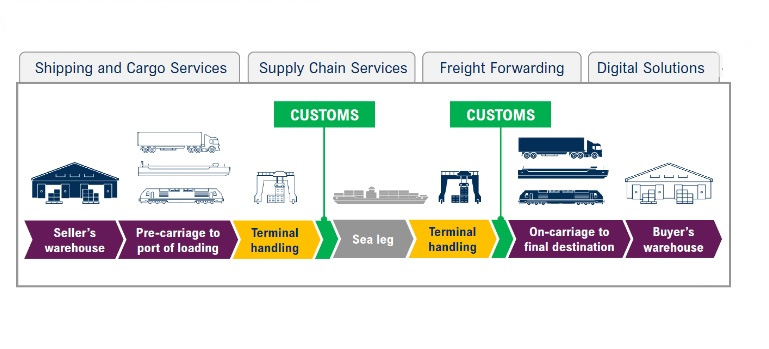
Local Customs Clearance
Importance:
Regulatory Compliance: Each country has its own customs regulations, tariffs, and import/export laws. Ensuring compliance is crucial to avoid delays and fines.
Documentation Management: Proper documentation (invoices, packing lists, certificates of origin, etc.) is essential for smooth customs clearance.
Expertise: Local customs brokers possess the knowledge and experience to navigate complex regulations, ensuring that shipments clear customs efficiently.
Process:
Pre-Clearance Preparation: Gathering all necessary documents and information before the shipment arrives.
Customs Declaration: Filing the required paperwork with local customs authorities.
Duties and Taxes Payment: Calculating and paying any applicable duties and taxes to facilitate clearance.
Inspection Coordination: Coordinating with customs for potential inspections and ensuring compliance with safety and quality standards.
Local Land Transportation
Importance:
Last-Mile Delivery: Once customs clearance is completed, local transportation is vital for delivering goods to their final destination.
Efficiency: Local logistics providers can optimize routes and schedules, ensuring timely delivery.
Flexibility: Local transport solutions can adapt to changing circumstances, such as urgent shipments or special handling requirements.
Process:
Carrier Selection: Choosing the appropriate local transport provider based on the type of goods, delivery speed, and cost considerations.
Route Planning: Developing efficient transportation routes to minimize delays and costs.
Tracking and Communication: Providing clients with real-time tracking updates and maintaining communication throughout the transportation process.
Delivery Confirmation: Ensuring that goods are delivered to the correct location and obtaining confirmation from the recipient.
Offering local customs clearance and land transportation services is essential for logistics providers aiming to meet the needs of overseas clients. By integrating these services, companies can streamline the supply chain, enhance customer satisfaction, and ensure that goods reach their final destinations efficiently and compliantly. As global trade continues to evolve, the demand for comprehensive logistics solutions will only increase, making these services a critical component of modern logistics strategies.
COOPERATE WITH LOCAL PARTNERS AT QUICKER INTERNATIONAL LOGISTICS
Trustful Partner of Ocean Freight Forwarding
At Quicker International Logistics, providing ocean freight forwarding service, we understand that the complexity of modern logistics requires a collaborative approach. While we pride ourselves on our extensive network and capabilities, we recognize that no logistics company can manage every aspect of international shipping single-handedly. Therefore, we strategically partner with local advantage partners in various countries to enhance our service offerings, particularly in customs clearance and local land transportation.
Our collaboration with local partners is built on a foundation of trust, reliability, and expertise. As a proud member of the WCA (World Cargo Alliance), we have access to a global network of vetted logistics providers who share our commitment to excellence. These local partners are well-versed in their respective countries’ customs regulations and procedures, allowing us to ensure compliance and streamline the clearance process for our clients. By leveraging their in-depth knowledge of local laws, tariffs, and documentation requirements, we can facilitate smooth customs operations, minimizing delays and potential penalties for our clients.
In addition to customs clearance, our partnerships extend to local land transportation. We recognize that last-mile delivery is critical in the logistics chain, and local partners play a vital role in this process. By collaborating with trusted transport providers, we can offer flexible and efficient solutions tailored to our clients’ needs. These local partners have the advantage of understanding regional infrastructure, traffic patterns, and delivery nuances, enabling us to optimize routes and ensure timely deliveries.
Moreover, our partnerships allow us to provide comprehensive, end-to-end logistics solutions. By integrating local expertise with our global capabilities, we can manage the entire supply chain process, from origin to destination. This not only enhances the efficiency of our operations but also improves customer satisfaction, as our clients benefit from real-time updates and seamless communication throughout their shipment’s journey.


